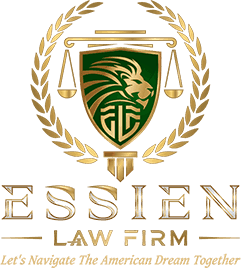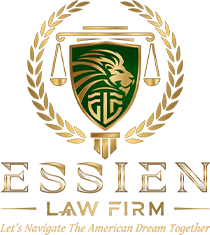
Phoenix Nonimmigrant Visa Lawyer
Warm and Compassionate Legal Assistance from an Immigrant Attorney
There is a range of visa types for different needs, such as employment. There are also special programs for children of immigrants, such as Deferred Action for Childhood Arrival (DACA). If you are looking at applying for a nonimmigrant work visa or other immigration program, Essien Law Firm can help you. We have personally gone through the immigration process, so we understand the emotional as well as the legal hurdles you are facing. Your case is always solvable to us, and we will work hard for you as we fight for your visa rights.
How Long Can Someone Stay in the U.S. on a Nonimmigrant Visa?
- For visitors from participating countries traveling to the U.S. without a visa, visits must be limited to 90 days.
- The duration of stay on a B-1 or B-2 visitor visa can be a maximum of 6 months, with the possibility of extensions in qualifying cases.
- The maximum period of stay for certain nonimmigrant visas is 90 days, with no extension permitted.
- Extensions of stay can be applied for at least 45 days before the authorized stay expires under certain conditions.
It's important to check the specific requirements and conditions for each type of nonimmigrant visa to determine the exact duration of stay allowed and reach out to our Phoenix nonimmigrant visa lawyer with any questions you may have.
If you need help applying for non-immigrant visa, contact Essien Immigration Law for a Phoenix citizenship lawyer at 602-833-2650.


Types of Nonimmigrant Visas
A nonimmigrant visa is a temporary visa for individuals coming into the US with the intent to eventually return to their country. Whereas immigrant visas are for those who seek to stay permanently in the US as citizens, nonimmigrant visas are for temporary visits, such as for work.
There are over 20 different types of nonimmigrant visas. Some of the most common employment-related visas include:
- H-1B Visa – This is the most popular employment-based visa for working professionals and is offered to people in a “Specialty Occupation.” The visa requires a 4-year college degree or its equivalent. It is used by most American businesses to employ foreign workers in occupations that require technical or theoretical expertise in specialized fields (e.g., engineers, scientists).
- F-1 Visa – Also known as the “student visa,” the F-1 Visa is a temporary intent visa for foreign students looking to study in the United States.
- J-Visa – This is the Exchange Visitor (J-1) Visa for individuals who have been approved to participate in an exchange visitor program in the United States. Approved individuals might be short-term scholars, students, physicians, teachers, professors, and research scholars.
- Q-1 Visa – Similar to the J-1 Visa, this one is also for exchange programs in the United States, though it focuses on participants of certain International Cultural Exchange Programs designed to provide training and employment while also encouraging participants to share their culture, history, and traditions with the United States.
- L-1A Visa – The L-1A Visa for Intracompany Transferee Executive or Manager allows an employer to transfer a manager or executive from one of its affiliated offices in another country to its office in the United States. It also permits a company that does not have a US office to send an executive or manager to the US for the purposes of establishing one here. These visas are valid for up to 7 years and can be converted to lawful permanent resident (LPR) status.
- L-1B Visa – The L-1B Visa for Intracompany Transferee Specialized Knowledge allows a company to transfer someone with a specialized knowledge relating to their business interests to its United States office. It also permits a company with no American office to send someone with specialized knowledge to establish an office in the US. These visas are valid for up to 5 years.
- E-2 Nonimmigrant Visa – This is a treaty-based visa for foreign nationals investing a substantial amount of capital in US-based businesses. A qualifying national of the treaty country must show at least 50% ownership of the business they intend to invest in. These visas are valid for 2 years and can be renewed.
Other types of visas that are commonly brought up are:
- R Visa – This is for religious workers who want to enter the US to work in religious capacities.
- P-3 visa – This visa is for artists or entertainers to perform, teach, or coach a culturally unique program or provide a traditional ethnic, folk, cultural, musical, theatrical, or artistic performance or presentation.
- O-1 Visa – This is for individuals with “extraordinary ability or achievement” in science, education, art, athletics, or business demonstrated by sustained national or international acclaim and recognition in their field.
- K-1 Fiancé(e) Visa – This visa allows a US citizen who is engaged to a foreign national to bring that person to the US to marry. It is a visa of temporary intent, and the pair must marry within 90 days of the foreign fiancé entering the US.
-
24/7 Availability
-
Unique Perspective
-
Hardworking
-
Relatable

-
Immigration is very complicated and you need an intelligent attorney to represent you, Lelia is that attorney.
- Phillis M. -
I have used multiple attorneys in the past and Lelia has proven to exceed my expectations, she was completely understanding, professional and worked very diligently to the end and I’m so grateful!
- Walter S. -
I have to admit that I was really impressed by the way she handle the case to bring it to a successful outcome in a very short period of time.
- Elie Z. -
We are grateful to you Lelia Adams for your efforts you made since the very beginning of my husband Aloysius Davis Immigration process from South Korea
- Alice D. -
Her knowledge of the laws when it comes to immigration is impeccable.
- Timothy W.
Deferred Action for Childhood Arrival
Another important nonimmigrant matter is the Deferred Action for Childhood Arrival (DACA) program, which allows certain people who came to the United States as children to work legally without fear of deportation for two years (subject to renewal).
In order to qualify for the DACA program, you must meet all the following requirements:
- You are under the age of 31 as of June 15, 2012.
- You came to the US before your 16th birthday.
- You have continuously resided in the US Since June 15, 2007, up to the present.
- You were physically present in the US on June 15, 2012 and at the time of making your request for consideration of deferred action with the USCIS.
- You entered without inspection before June 15, 2012, or your lawful immigration status expired before then.
- You are currently in school, graduated or obtained a certificate of completion from high school, obtained a general education development (GED) certificate, or are an honorably discharged veteran of the coast guard or the United States Armed Forces.
- You have not been convicted of a felony, significant misdemeanor, or three or more misdemeanors, and you do not otherwise pose a threat to national security or public safety.
For all your nonimmigrant visa concerns, reach out to Essien Law Firm. We can offer sound guidance on what visa is most appropriate for your situation and how to navigate any ensuing immigration concerns, such as your DACA status.
Schedule a free consultation with our firm today to get started. Let’s protect your rights as a foreign national entering the US.

